Tuning the Hyundai Delta
"All you need to know about performance parts and tuning the Hyundai Delta engine!"
Carref prides itself on providing the latest tips and guides to your modification project.
We look at Delta tuning and provide tips on the best modifications for your engine block.
We cover tuning tips for the following engine codes.
G6BW/G6BVV /G6BA/G6BAX/G6BAY
Hyundai Delta are awesome to work on and with the optimum tuning parts like a remap, turbo upgrades and camshafts you will noticeably maximise your driving opportunities.
We review and look at Delta tuning and show the optimum modifications for your Delta engine. Hyundai Delta are awesome to work on and with the optimum uprated enhancements like a remap, turbo upgrades and camshafts you will enhance your driving pleasure.
We rely on our visitors to pass on tips and tell us about their projects and what worked on their car, and this article is the culmination of the feedback we have received. First let us look at the history and specs of this engine and then consider which tuning modifications work best on it.
History of the Engine
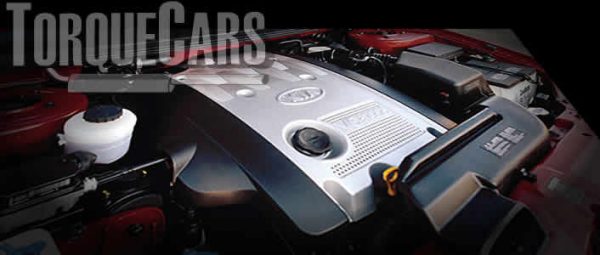
G6BW/G6BVV
- 2.5 liter version with 170 hp @6000 rpm 170 lbft @3750 rpm
G6BA/G6BAX/G6BAY
- 2.7 liter version 165–172 hp @6000rpm 181 lbft @4000rpm
The Delta engine was used in the following models
- Hyundai Grandeur (1998-2005)
- Hyundai Sonata (1999-2005)
- Kia Optima (2000-2006)
- Hyundai Santa Fe (2000-2006)
- Hyundai Coupe (2001-2009)
- Hyundai Tiburon (2003-2008)
- Hyundai Trajet
- Hyundai Tucson (2004-2009)
- Kia Sportage
What are the most effective Delta parts
Just because a upgrades is popular with Delta owners it doesn't mean it is good, we will ultimate upgrades that will give your Delta the best power gain for you spend.
The camshaft profile plays a big part in the engines power output so camshaft upgrades make quite a large difference. The intake and exhaust durations will alter depending on the chosen camshaft profile, so large torque gains are on offer for camshaft upgrades.
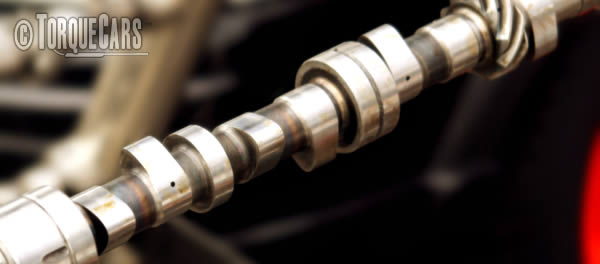
Fast road cams usually raise the power across the rev band, you could sacrifice a little low end torque but high end rpm power will be higher.
Motorsport and race cams, raise the high end rpm power band but as a result the car will not idle smoothly and low end power nearly always suffers.
On a daily driver you need to optimize your torque band to your usage of the car.
I would be surprised if you have found a Competition cam is a pleasure to live with when driving around busy urban areas.
Each engine responds better to extreme camshaft durations so view each engine as unique.
The engine timing and fuel pump and injectors also have an effect on the torque gains you'll achieve.
A longer valve duration can alter the torque band and on most engines the exhaust and intake durations do not need to match, although most cams and tuners use matched pairs there are some advantages to extending the intake or exhaust durations.
Please watch our introduction Video tutorial to car tuning. Be sure to subscribe and support our new channel.
How to tune your car
- Improve the handling
Focus on Suspension improvements, such as coilovers and make sure the bushings are in good order and that the alignment is correct. Then focus on improving the brakes, with a big disk brake conversion kit and fast road brake pads.
- Remove restrictions
Focus on the intake and exhaust with filters being the common point of restriction in a tuned car. Intercoolers may also become restrictive on turbo engines so this may also need to be uprated.
- Burn more fuel & air
Increase the fuelling so it matches the air coming into the engine. The ratio is important so you need to improve the fuel pump and injectors, so the head mods, big valve conversions, fast road camshafts and forced induction upgrades extra supply of air is adequately met.
- Test and replace any weak parts
Weak areas are commonly the clutch, the turbocharger and pistons and crankshaft in a highly tuned engine. Makes sure these components will cope with your power aspirations.
- The Tune or Remap
A cars ECU controls the fuel, timing, spark and even the turbo in some cases, so to fully extract your gains you should remap the car last and this will fully release the power. Some cars are easy to map, and others require piggyback ECU's or aftermarket ECU's but this is the most vital step of your tuning project.
Modifying to Stage 1:
Panel air filters, Sports exhaust manifold, Intake headers, Fast road camshaft, Remaps/piggy back ECU, Drilled & smoothed airbox.
Modifying to Stage 2:
Ported and polished head, fuel pump upgrades, induction kit, high flow fuel injectors, Sports catalyst & performance exhaust, Fast road cam.
Modifying to Stage 3:
Internal engine upgrades (head flowing porting/bigger valves), Engine balancing & blueprinting, Crank and Piston upgrades to alter compression, Twin charging conversions, Competition cam, Adding or Upgrading forced induction (turbo/supercharger).
A remap should help to fully realize the full potential of all the tuning parts you've done to your Delta.
It will usually give around 30% more power on turbocharged vehicles and 15% on NASP engines, but you mileage will vary depending on the tuning parts you've done and the condition of your engine.
Feeding air and fuel into the Delta engine is the whole point to any tuning task.
Headers flow the air from the intake filter and allow it to be fed into the engine and mixed with fuel.
Structure and rate of flow of the Headers can make a substantial effect on to fuel engine efficiency on the Delta.
Most plenum chambers are in desperate need of performance upgrades, although a few manufacturers provide reasonably well designed plenum chambers.
Adding a Delta larger valve kit, getting port work and head flowing will also boost bhp and torque, this will afford you an improved bhp and torque increase on other upgrades.
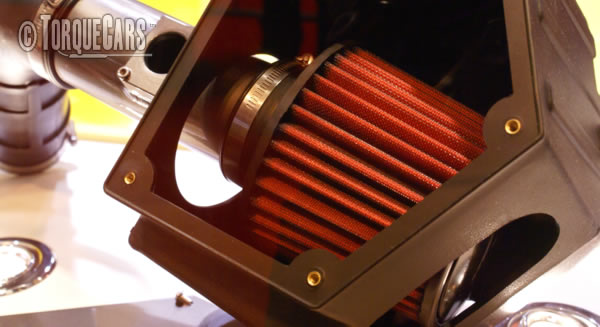
Which turbo upgrades are best?
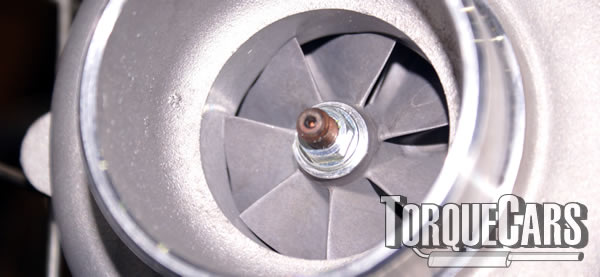
NASP engines need quite a lot of work when you add a turbo, so we have a separate guide to help you take into account the pros and cons of going this route on your Delta
The more air to get into an engine, the more fuel it can burn and uprating the induction with a turbocharger upgrade makes massive power gains.
When the engine is turbo charged upgrades are simpler to install and we find turbo engines use more solid components.
However you'll find engines have limits
Discover these restrictions and install better quality components to utilize the power.
We've seen tuners spending a a stack of money on turbo upgrades on the Delta only to have the engine throw a rod just after it's been completed.
Large capacity turbo units tend to suffer a bottom end lag, and low capacity turbo units spool up more quickly but won't have the peak end torque gains.
In the last 10 years the market of turbochargers is always developing and we now see variable vane turbochargers, where the vane angle is altered according to speed to lower lag and increase top end power.
Twin scroll turbochargers divert the exhaust flow into 2 channels and push these at differently angled vanes in the turbocharger. They also improve the scavenging effect of the engine.
It is common that there is a limit in the air flow sensor MAF/MAP on these engines when a lot more air is being pulled into the engine.
Going up you'll find 4 bar air sensors coping with quite large power gains, whereas the OEM air sensor was restricting bhp at a much lower level.
Adding a supercharger or additional turbo will make large bhp and torque gains, although more difficult to install. We have a twincharger bhp and torque adding guide if you want to read more.
Fuelling
Don't overlook the need to pay attention to the fuelling when you are increasing the bhp - it makes the car more thirsty. 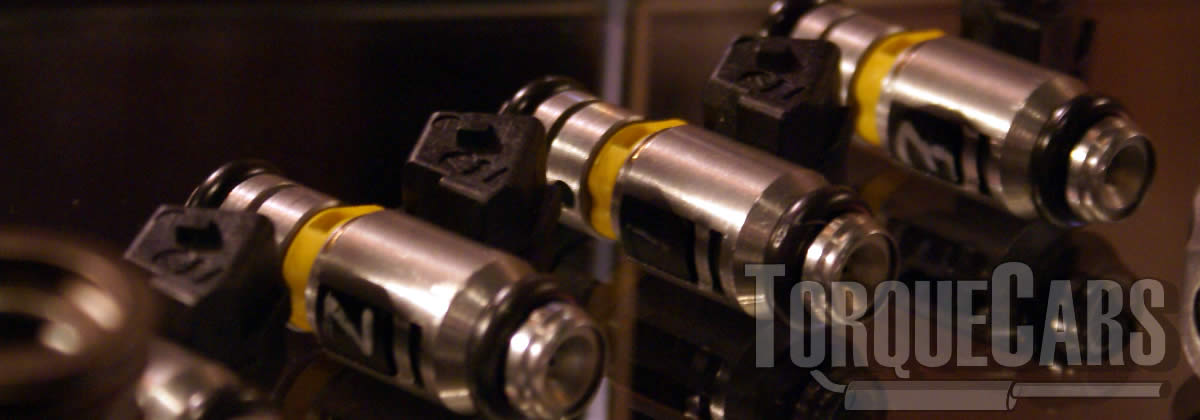 We would recommend you to be generous with your injector capacity.
We would recommend you to be generous with your injector capacity.
The accepted safe increase is to add 20% when specifying an injector, this takes into account injector deterioration and gives some spare capacity should the engine need more fuel.
We think this one is common sense, but you'll need to match your fuel injector to the type of fuel your car uses as well.
Choosing the right performance exhaust
One of the most common mistakes and problems we see in tuning projects is usually down to the exhaust, or rather a poorly chosen exhaust for your engine.
Only look to upgrade your exhaust if the existing exhaust is creating a restriction.
On most factory exhausts you'll see your flow rate is still ok even on modest power gains, but when you start pushing up the power levels you will need to get a better flowing exhaust.
Sports exhausts increase the flow of gases through the engine.
But if the exhaust pipe is too big, ie: it's over 2.5 inches bore, you will lose a lot of the exhaust flow rate and end up lacking power and torque.
Typically exhaust restrictions can be located the catalysts installed, so adding a better flowing race alternative will help avoid this restriction.
Weak spots Issues & problem areas on the
The engines are generally reliable and solid as long as they are regularly serviced and maintained.
Regular oil changes are vital on the , especially when tuned and will help extend the life and reliability of the engine.
For more information on Tuning your engine please join us in our friendly forum where you can discuss tuning options in more detail with our owners. It would also be worth reading our unbiased tuning articles to get a full grasp of the benefits and drawbacks of each modification.
Please help us improve these tips by sending us your feedback in the comments box below.
We love to hear what our visitors have got up to and which mods work best for them on each model of car. Comments are used to improve the accuracy of these articles which are continually updated.
If you liked this page please share it with your friends, drop a link to it in your favourite forum or use the bookmarking options to save it to your social media profile.
Check out TorqueCars new YouTube channel, and see their awesome new content...
Feedback
Please use our forums if you wish to ask a tuning question, and please note we do not sell parts or services, we are just an online magazine.
Help us improve, leave a suggestion or tip
